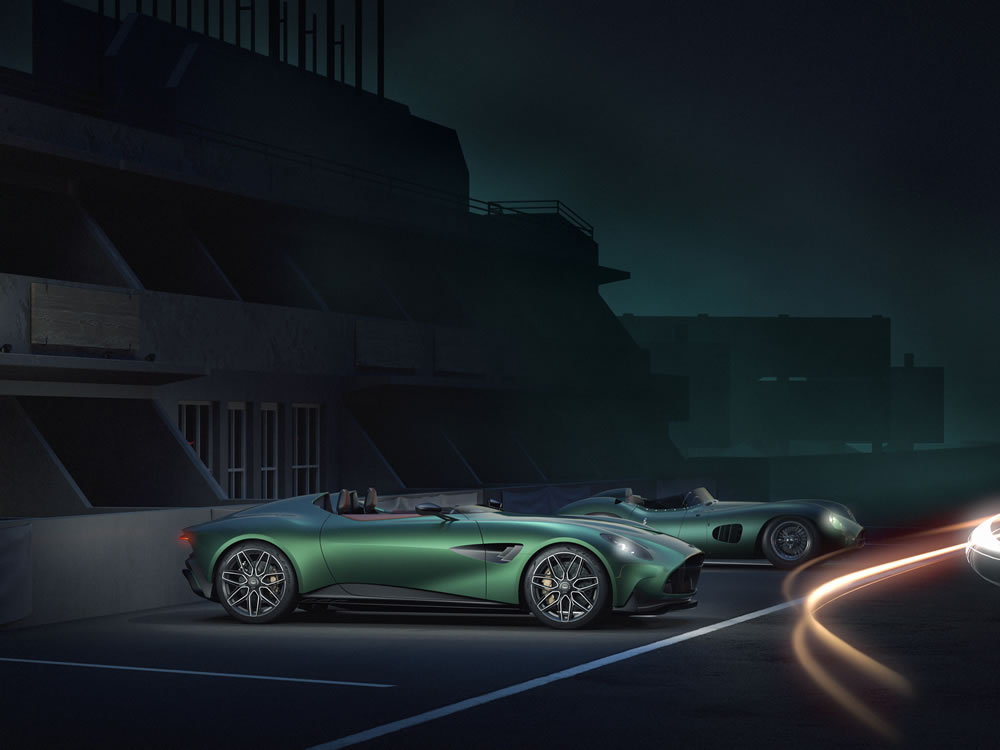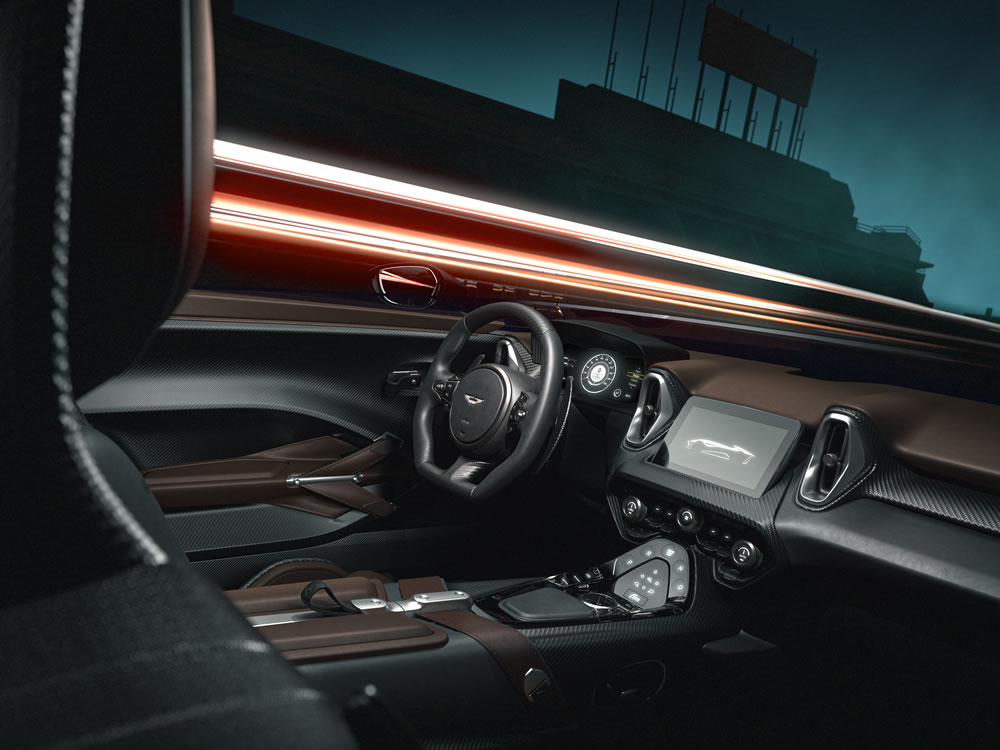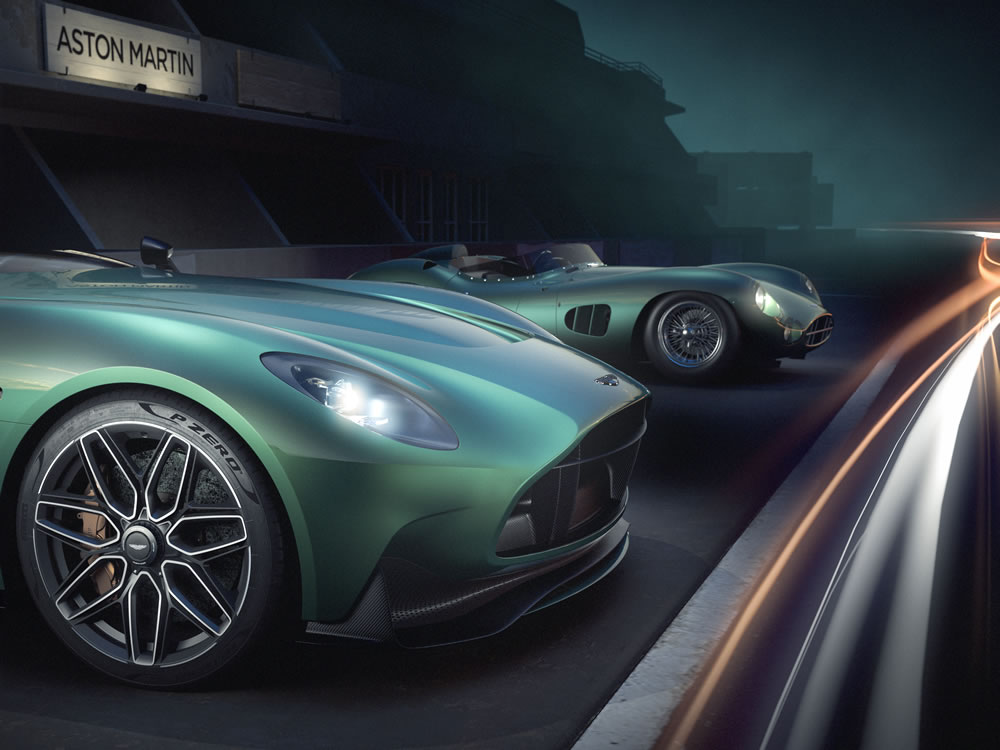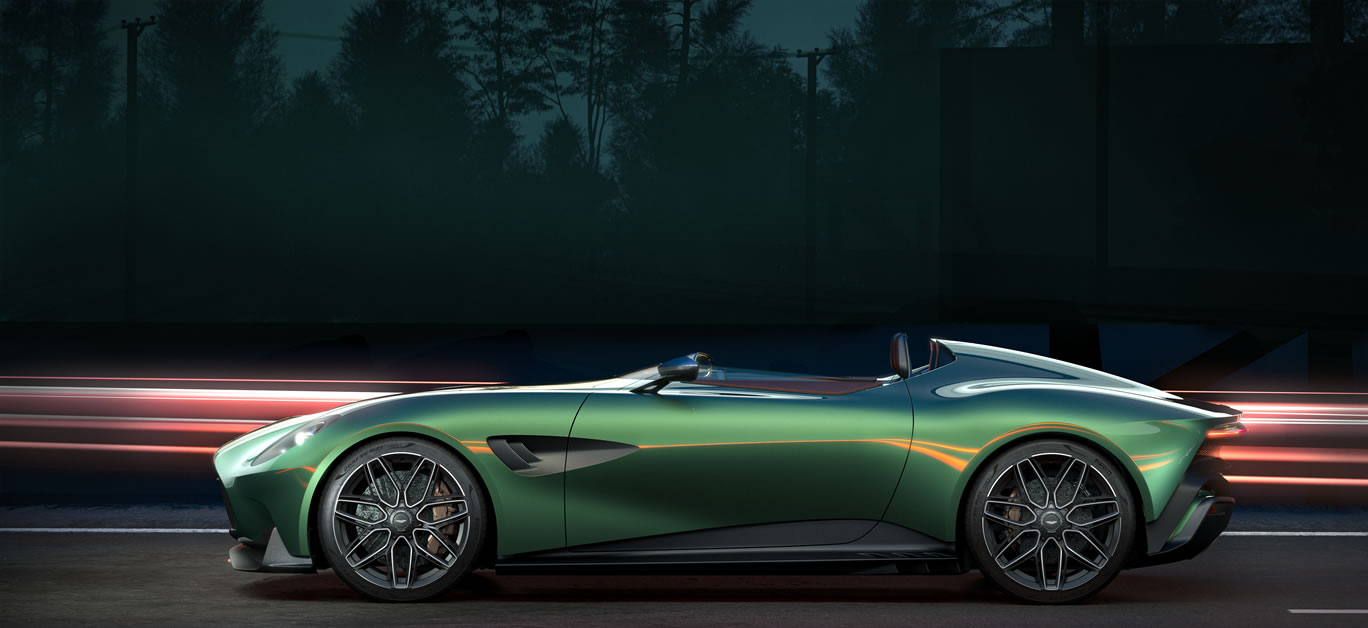Aston Martin has recently unveiled its spectacular DBR22 – a V12-engined two-seater coach-built design concept, celebrating the marque’s extraordinary bloodline of open-cockpit sports racers.
The creation of the DBR22 design concept, unveiled in California, is the latest in a long line of extraordinary projects expertly handled by in-house bespoke division, Q by Aston Martin, which this year celebrates a decade of building exclusive cars for the world’s most discerning customers.
Iconic one-off commissions such as Aston Martin Victor, and low volume specials such as Vulcan – limited to 24 examples worldwide, and Vantage V600 – limited to just 14, are truly magnificent examples of these collaborations. It seems only fitting then, that the DBR22 design concept should also form the basis of a production reality example for an ultra-exclusive number of Q by Aston Martin customers.
By mating the classic art of coachbuilding with advanced materials and cutting-edge manufacturing technologies, DBR22 is a perfect blend of design purity, engineering precision, heart-pounding performance and true passion. A perfect celebration of Q by Aston Martin and its limitless potential. All underlined by the knowledge it is one of the rarest Aston Martins in the marque’s rich 109-year history.
With classic proportions and immaculate, muscular curves, DBR22 unashamedly speaks of tradition – specifically Aston Martin’s lifelong lineage of world-beating two-seater open-cockpit sportscars such as the DBR1 and DB3S – but expresses it with a dynamic new take on this compelling theme.
DB3S represents an important piece of Aston Martin’s competition history. Introduced in 1953, Frank Feeley’s alloy DB3S body became known for its curves and aerodynamic efficiency, establishing Aston Martin as a serious Le Mans contender and scoring some impressive results along the way. DBR1, known as the ultimate Aston Martin sportscar, took Feeleys design language a stage further and became one of the most important, influential Aston Martins of all time – winning a number of notable races, the most famous of course being Le Mans in 1959, driven by Carroll Shelby and Roy Salvadori, and taking the Aston Martin team onto the ultimate victory: winning the World Sports Car Championship in the same year (‘59.)
Eye-catching exterior

The DBR22 design concept showcases a completely new body from the designers at Aston Martin. Its exceptional coach-built form is created from a minimal number of body panels to create a more sculpted, muscular presence. The result: a smooth and effortless blend of exceptional drama and elegance, with several unique design features to complement.
A particularly noteworthy feature is the entirely new front grille which incorporates a unique carbon fibre design in place of the usual veins seen on series production Aston Martins. This design takes inspiration directly from the DBR1 and DB3S, giving a unique identity; one which clearly draws from Aston Martin’s heritage but uses this inspiration to create a truly contemporary design.
The bonnet features a dramatic horseshoe vent, recessed to aid airflow from the 5.2-litre V12 Twin-Turbo engine that sits beneath it. This long, unbroken bonnet line draws your eye back towards the cockpit, over the lowline wind deflector and delicate mirrors, which are mounted to the tops of the doors on slender, wind-cheating carbon fibre arms.
Sitting perfectly within the wheel arches is a set of all-new 21-inch alloy wheels. Featuring a unique 14-spoke design created especially for the DBR22, these lightweight wheels feature a motorsport-derived centre-lock hub, which is also available to spec from an extensive colour palette.
The DBR22 design concept also showcases an entirely bespoke paint colour, developed specifically for the occasion using Paint to Sample – an exclusive option available through Q by Aston Martin, demonstrating again the vast design possibilities attainable through the marques bespoke service.
Classic and contemporary interior

The DBR22’s cockpit continues the fusion of classic and contemporary approaches with many unique components and an extensive use of both leather and exposed carbon fibre. With architecture defined by the all-new dashboard and sleek infotainment displays, it sets the tone for a clean, uncluttered environment. Though taking inspiration from Aston Martin’s world-beating competition cars, the DBR22 is no bare-bones racer inside. Supple aromatic hides swathe the contemporary dashboard, the carbon fibre performance seats and extend over the tops of the doors to create an inviting hint of the interior.
Rising from behind the seats are twin nacelles which smooth the airflow behind the driver and passenger’s heads. At the rear, DBR22 design concept has an unmistakable horizontal light graphic courtesy of the slim, full-width light bar made specially for this application. Beneath it sits a perforated panel to allow hot air to exit the tail. This beautifully sculptural piece is yet another unique highlight of the DBR22 intriguing design. Together with the smoothly integrated diffuser and pair of large diameter exhaust tailpipes, the DBR22 has incredible road presence, perfectly capturing the raw emotion of the driving experience.
With an extensive options palette available through the celebrated bespoke service, Q by Aston Martin offers customers of all Aston Martin models the chance to create something completely unique. As well as paint colours and finishes, bespoke graphics through to tinted carbons and bespoke materials on both the interior and exterior, every Q by Aston Martin car can push the limits of design and desire and is completely tailored to the customer.
Potent V12
Thanks to an immensely potent 5.2-litre V12 Twin-Turbo powertrain the DBR22 backs-up its extraordinary looks with truly breath-taking performance; peak outputs of 715PS and 753Nm providing sufficient propulsion to accelerate the DBR22 from a standstill to 60mph in just 3.4sec and on to a top speed of 198mph/319kmh. With nothing but the slipstream between the driver and this epic engine’s unforgettable twelve-cylinder howl, the DBR22 promises to be an intense sensory stimulation.
True driver connection

Dynamically, the DBR22 targets true driver connection, with a chassis honed to deliver precision, agility and tactility in equal measure. Unique calibration of the engine and eight-speed paddle-shift automatic transmission uses torque shaping to give the DBR22 a manner and delivery unlike any other model. A pinned steering column brings greater accuracy but also provides more detailed feedback so the driver can build a more accurate picture of available grip.
Attention has also been paid to the DBR22’s chassis structure. Unique front and rear shear panels further increase torsional rigidity, with a bespoke calibration for the adaptive dampers providing precision and pliancy for a blend of body control and ride refinement that will make the DBR22 an absolute pleasure to drive – on road or racetrack.
The DBR22 also features a 3D printed rear subframe – the first time Aston Martin has introduced such a method. The component is made from multiple 3D printed parts printed from aluminium, which are then bonded to form the finished subframe. The advantages are clear, with a significant weight saving and no reduction in stiffness, plus the ability to make special parts for ultra-low volume models, where required.























